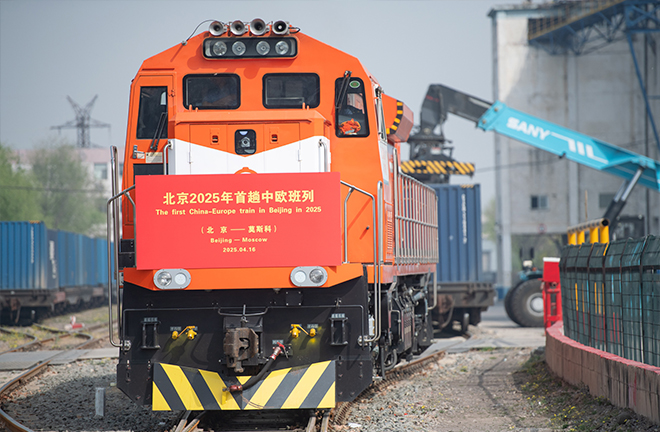Int’l scholars hail Xi’s visit to Russia

The first China-Europe train in Beijing in 2025 departs to Moscow on April 16. Photo: IC PHOTO
From May 7 to 10, Chinese President Xi Jinping paid a state visit to Russia and attended commemorative events marking the 80th anniversary of the Soviet Union’s victory in the Great Patriotic War. The year 2025 also marks the 80th anniversary of the Chinese People’s War of Resistance Against Japanese Aggression and the World Anti-Fascist War, as well as the founding of the United Nations.
Scholars in China and abroad believe that Xi’s 11th visit to Russia has not only strengthened the longstanding friendship between the two nations and invigorated bilateral ties, but also provided a powerful example of shared commitment to preserving the hard-won legacy of WWII.
‘Special visit in special year’
“This is a special visit in a special year,” said Boris Guseletov, a senior fellow from the Institute of Europe at the Russian Academy of Sciences, in an interview with CSST. He noted the symbolic weight of the 80th anniversaries of the victory in the World Anti-Fascist War and the establishment of the United Nations, among other milestones in international relations, suggesting that these events carry significant historical resonance and geopolitical implications.
“This is the first face-to-face meeting in 2025. The signal sent by this visit also concerns the strengthening of strategic partnerships. The first-person diplomacy means a new chapter for the interaction between the two, which plays an important role in Russia-China relations,” added Guseletov. In his view, this meeting could be an important milestone not only for China-Russia relations, but also for global political dynamics. At a time of mounting global challenges—including economic sanctions, regional conflicts, and climate change—this high-level dialogue signals both countries’ intention to reinforce coordination and cooperation.
During the meeting, the two heads of state witnessed the exchange of more than 20 bilateral cooperation documents between China and Russia, covering areas such as global strategic stability, upholding the authority of international law, biosecurity, investment protection, the digital economy, quarantine protocol, and film cooperation.
Zhang Hong, a research fellow from the Institute of Russian, Eastern European, and Central Asian Studies at the Chinese Academy of Social Sciences, told CSST that the joint statement on global strategic stability issued by China and Russia represents a new high in strategic trust between the two countries.
Since the end of the Cold War, the scale of bilateral economic ties has continuously expanded, with trade reaching a historic peak, Zhang said. The two sides have gradually widened cooperation from commodity trade, industrial chain cooperation, and infrastructure to include cross-border e-commerce, service trade, and financial settlement, exploring new fields in investment expansion, technology, and the development of Arctic shipping routes. In recent years, China-Russia cooperation has held firm against pressure from Western sanctions, maintaining a robust momentum in the joint construction of the Belt and Road Initiative and the integration of the Eurasian Economic Union.
Defending outcomes of WWII history
Eighty years ago, the Chinese and Russian peoples supported each other while fighting side by side, making enormous sacrifices in the struggle against fascism. Their efforts not only helped secure victory in WWII, but also made lasting contributions to global peace and human progress. Yet in some Western narratives, this history is either downplayed or distorted, with the roles of China and the Soviet Union diminished—an omission that continues to skew public understanding of the war.
Zhang argued that distorted narratives of WWII—such as the neglect of China’s role and a Western-centric perspective—are rooted in postwar Western hegemonism. These misleading interpretations seek to exaggerate Western contributions while downplaying or even discrediting China’s role on the Asian front. Today, right-wing forces and political parties in certain countries continue to obscure and distort the historical record through various means, promoting racist and exclusionary ideologies. In pursuit of political gain, some politicians have even gone so far as to whitewash fascism. These false narratives have not only deepened political divisions at home but also undermined the open and pluralistic values that were established in the postwar era.
“The Russian, Chinese, and Serbian nations are among those who suffered by far the most during WWII against Nazism, fascism, and militarism, and were key contributors to victory, be it on the Asian or European front,” said Aleksandar Mitić, a research fellow from the Center for the Belt and Road Studies at the Institute of International Politics and Economics in Belgrade, Serbia, to CSST. “As such, they have the full right not only to celebrate together this tremendous victory, but also have the obligations toward the victims, the heroes and to the descendants, to defend the values and truth against any attempts at relativization and revisionism.”
Li Xing, director of the Center for European Studies at Guangdong University of Foreign Studies, underscored that Western “historical revisionism” represents a blatant alteration of history—constructing false narratives about WWII using erroneous logic while politicizing and weaponizing history to serve contemporary geopolitical agendas. In this context, China and Russia continue to uphold the historical judgments rendered by institutions such as the Nuremberg Trials and the Far East International Military Tribunal, adhering to the authority of international law and the global order of justice.
“We should not forget that the establishment of the post-war international order is centered around the United Nations, whose legitimacy stems from the justice of the anti-fascist war and the contributions of participating countries. China and Russia cannot accept the West’s one-sided interpretation of WWII history, as this not only concerns the defense of historical truth but also relates to preserving national dignity and the legitimacy of the international order,” Li said.
Edited by CHEN MIRONG

 PRINT
PRINT CLOSE
CLOSE